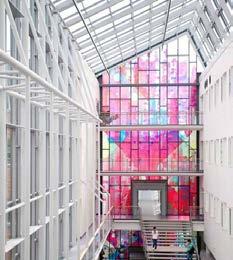Seattle Health District Proposal
“The power of community to create health is far greater than any physician, clinic,
or hospital.”
-Mark Hyman

“The power of community to create health is far greater than any physician, clinic,
or hospital.”
-Mark Hyman
In 1936, Seattle’s Central District was divided: East of 14th Street was deemed “Hazardous” by the Home Owner’s Loan Corporation (HOLC), causing major segregation in the City. Therefore, the Health District’s mission is to improve connectivity across all five major institutions, not only in terms of infrastructure, but also in the sense of community.
The masterplan aims to achieve this goal through physical improvements of the public realm—specifically along Jefferson Street and Boren Avenue—and through careful programming within these areas. Envisioned is a cohesive identity of place that would allow students, caregivers, and neighbors from all ages, genders, and races to enjoy and take part in the newly designed spaces, fostering opportunities for cross-community encounters across the neighborhood.
Infill opportunities, creation of open spaces, and general street improvements used together will enhance the public realm, while adaptive reuse techniques employed at Cherry Hill transform the campus into Medical Specialty Pavilions. With these clinical programs to strategically anchor a new Medical Boulevard, the Health District re-imagined becomes a major Seattle destination.


The proposed Medical District lies at the dividing line between Seattle’s Downtown and Central District. Bounded by Union Street and Yesler Way to the north and south, and I-5 and 18th Avenue to the east and west, the Medical District is well-connected both within and out to the surrounding neighborhoods due to a regular street grid and cross-district corridors.
Campuses
Boundary
Corridors
“Redlining”
Bus, Shuttle, and Streetcar network expansions would promote transit options within the Medical District and connect out to regional transit such as the Link light rail and Sounder commuter rail.


Green networks identify corridors for landscaping improvements and connectivity to existing green infrastructure in the surrounding city.

Seattle University
Medical Campuses
Green Spaces
Existing Buildings
Master Plans Proposals
Proposed Development
Proposed Greens
Existing Trees
Proposed Trees

The following projects are proposed within the Health District:
Project 1: Street, Alley, and Pedestrian Improvements
-Jackeline Del Arca
Project 2: Community Engagement Health Clinic -Adeline Angelino
Project 3: Gateway to Seattle University -Mohammad Alramadan
Project 4: Providence Pavilion at Cherry Hill
-John Carlisle
Seattle University
Medical Campuses
Green Spaces
Existing Buildings
Master Plans Proposals
Proposed Development
Proposed Greens
Existing Trees
Proposed Trees
Projects
With the Swedish Hospital First Hill Campus transforming into a world class medical center for the Seattle metropolitan area, the Swedish Hospital Cherry Hill Campus is well positioned to reinvent itself as a Medical Specialty Pavilion within the Medical District.
Historic imagery from 1936 reveals the original layout and organization of Providence Hospital, which the proposed addition aims to reflect and restore.



Providence Hospital, 1919

A timeline* of the facility’s incremental growth helps us to understand the sequence of piecemeal additions that created the campus as it exists today.
This practice of incremental building is familiar for many hospitals, which must continuously evolve to meet their community’s changing health needs.
However, these projects— historically reactive in nature—may not afford the same cohesive vision found of a proactive masterplan.
Today, much of the campus has aged significantly, and a drastic update would be necessary to address community needs, both of health and beyond.
*Refer to Building-Age.gif

Projecting into the next 10 years, three distinct scenarios were considered. All three imagine what the campus might become if redeveloped as a cohesive whole.
In each scenario, the proposed massings adhere to building setbacks and height limits set forth by the 2016 Cherry Hill Major Institutional Master Plan (MIMP).



Following an internal midterm review, Scenario 3 presented itself as an excellent candidate for further development...



This was based upon a desire to align the project with the Providence Mission and brand— represented by a cross of four equal arms, reaching out in all directions, symbolizing people of many backgrounds unified by a common ministry of service.

Swedish
Thus the Project Mission seeks to unify both Providence and Swedish brands, as well as the proposed Medical District with Seattle’s Central District through the transformation of the Cherry Hill campus.
Providence
Providence Pavilion at Cherry Hill
Swedish Central District Medical District

In support of the Project Mission, Oslo University Hospital, Rikshospitalet, and others were considered with one formal motif in common: pavilion wings organized along an interior “main street”. These main streets are flooded with natural light, feature foliage, and foster community and wellness for caregivers and patients, through uplifting circulation spaces.




The Providence Pavilion establishes the Cherry Street & Jefferson Street entrances as terminating vistas and neighborhood landmarks, linked together by the new, public pavilion parallel to the historic footprint of 17th Street, which formerly divided the block in front of James Tower.

Bird’s Eye View
For comparison of scale, the circle situated in the south plaza is the same diameter as the signage circle that exists at the campus today.



Restoring the “street” as a public space serves to mitigate the gap between the hospital’s institutional scale and that of the surrounding, predominantly single-family, residential neighborhood by improving pedestrian connectivity. Its contribution to the public realm will also include current tenants like Starbucks in addition to new medical retail, while offering an enhanced connection to the Dining Room and outdoor spaces for personal respite.


Diagram
Like the Providence cross, which is featured in the south plaza’s pavestones, the proposed plan reaches out in all directions, welcoming caregivers, neighbors, and students alike with entrances meeting the street.








